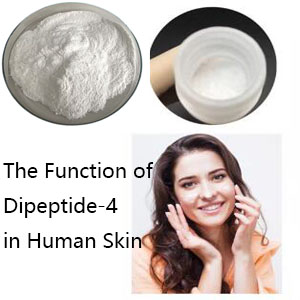The Function of Dipeptide-4 in Human Skin

In the ever-evolving world of skincare, ingredients like Dipeptide-4 are stealing the spotlight for their ability to protect and rejuvenate skin. If you’re wondering about The Function of Dipeptide-4 in Human Skin, this powerful antioxidant peptide is a game-changer. Composed of two amino acids, phenylalanine and tryptophan, it’s designed to shield your skin from environmental stressors like pollution and UV rays, while also fighting signs of aging caused by oxidative stress and glycation. This article dives into how Dipeptide-4 works, its benefits for skin health, and why it’s a must-have in your skincare routine. With a knack for boosting elasticity and keeping your complexion vibrant, it’s no wonder this ingredient is popping up in high-end serums and moisturizers.
Shielding Skin from Environmental Damage
Dipeptide-4 acts like a bodyguard for your skin, protecting it from the daily assault of free radicals, pollution, and UV rays. These environmental factors can wreak havoc, damaging DNA and accelerating aging by breaking down collagen and elastin. According to research, Dipeptide-4’s antioxidant properties neutralize free radicals, reducing oxidative stress that leads to wrinkles and dullness. By safeguarding skin cells, it helps maintain a youthful glow and keeps your complexion looking fresh, even in harsh conditions like city smog or intense sunlight.
Boosting Skin Elasticity and Youthfulness
One of the standout perks of Dipeptide-4 is its role in keeping skin firm and bouncy. It works by preventing glycosylation—a process where sugar molecules bind to proteins like collagen, making them stiff and less functional. This peptide’s anti-glycation properties help preserve collagen and elastin, the building blocks of plump, elastic skin. A study highlighted that Dipeptide-4 can enhance skin elasticity, making it a go-to for those chasing a smoother, more youthful look. It’s like giving your skin a daily dose of resilience to stay taut and radiant.
Enhancing Skin Repair and Texture
Beyond protection, The Function of Dipeptide-4 in Human Skin extends to repair. It supports the skin’s natural ability to heal by promoting cell turnover and reducing inflammation. Its compatibility with skin makes it easily absorbed, allowing it to work its magic on uneven texture or minor scars. Dipeptide-4 also helps disperse active ingredients in skincare products, ensuring they penetrate deeply for maximum effect. This makes it a favorite in formulations aiming to smooth out rough patches and even skin tone, leaving you with a polished, healthy complexion.
Safe and Versatile for All Skin Types
What makes Dipeptide-4 so appealing is its gentle nature. Unlike some ingredients that can irritate sensitive skin, this peptide is well-tolerated and safe for most users. Its low hazard rating, as noted by skincare safety databases, means it’s unlikely to cause redness or discomfort. Plus, it’s stable in cosmetic formulations, so you don’t have to worry about it losing potency. Whether you’ve got dry, oily, or combination skin, Dipeptide-4 fits seamlessly into your routine, delivering consistent results without the fuss.
Why Dipeptide-4 Deserves a Spot in Your Routine
With its multi-tasking abilities, Dipeptide-4 is more than just a trend—it’s a science-backed ingredient that delivers. From fighting free radicals to boosting collagen and improving texture, it tackles multiple skin concerns at once. While more research is needed to fully explore its long-term effects, current evidence suggests it’s a solid choice for anyone looking to protect and rejuvenate their skin. Next time you’re scanning ingredient lists, keep an eye out for Dipeptide-4—it might just be the secret to that glowing, healthy skin you’ve been after.
